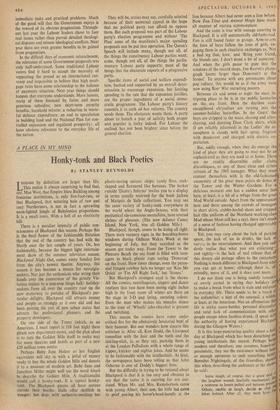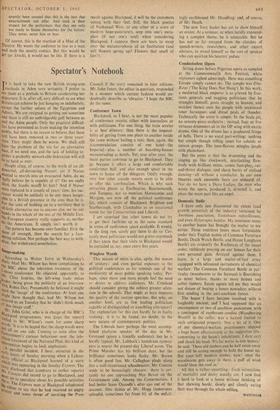A PLACE IN MY MIND
Honky-tonk and Black Poetics
By STANLEY REYNOLDS
LGENDS by definition are larger than life. This makes it always surprising to find that, say, Mae West, that Empire State Building among- feminine institutions, is only five-foot-two, or that Blackpool, that watering hole of raw and racy Northerners, is not in fact a sprawling neon-lighted jungle of Babylonian proportions. It is a small town. With a hell of an electricity bill.
There is a peculiar intensity of public con- sciousness of Blackpool this season. Perhaps this is the final flower of the fashionable flirtation that the rest of the country has had with the North over the last couple of years. Or, less fashionably, because the biggest light entertain- ment show of the summer television season, Blackpool Night Out, comes every Sunday live from the city's newest theatre. Anyway, this season it has become a mecca for nostalgia- seekers. Not just the enthusiasts who wring their hands over the conversion of the primly Vic- torian station to a non-stop bingo hall: holiday- makers from all over the country roar up the new motorway to partake of Blackpool's par- ticular delights; Blackpool still attracts money and people as strongly as it ever did and has been ,gaining the sort of new urban status that attracts the professional planners and the property developers.
On one side of the Tower (which, as an American, I must report is 518 feet high) there gleam new department stores, and the plan afoot is to raze the Golden Mile itself to make way for more theatres and hotels as part of a new £20 million town centre.
Perhaps Baby Jane Holzer or her English equivalent will sky in with a jetful of money ready to buy the whole Golden Mile and donate it to a museum of modern art. Baby Jane and Jonathan Miller might well use the word kitsch to describe the Golden Mile. A traditionalist would call it honky-took. It is typical honky- tonk. The Blackpool gipsies all have queues outside their booths. Stalls offer shellfish in vinegar; hot dogs with authentic-smelling but
plastic-tasting onions; chips; candy floss, rock- shaped and flavoured like bananas. The barker outside `Dante's Inferno' invites you to a display in terms usually reserved for the book jackets of Marquis de Sade collections. You may see the same variety of honky-tonk everywhere in the world where the Anglo-Saxons, with their puritanical sin-conscious mentalities, have erected shrines of pleasure. (The now defunct Coney Island, New York, was all Golden Mile.) Blackpool, though, seems to be doing all right. There were vacancy signs in the boarding-house windows during Oldham Wakes Week at the beginning of July, but they vanished as the season got under way. From the Tower to the Pleasure Beach the sea front is filled with teen- agers in black plastic caps saying 'Donovan' on the front. How times change, even the peren- nial fringed cowboy hats no longer say 'Kiss Me Quick' or 'I'm All Right Jack,' but 'Stones.'
But Blackpool's strongest card is .the shows. All the comics, ventriloquists, singers and dance routines that you have been seeing eight inches high in the front room all winter are there on the stage in 3-D and living, sweating colour. Even the man who makes his muscles dance to the tune of 'Wheels' (cha-cha-cha) is present and twitching. • This season the comics have come under critical fire for the obsessively lavatorial bent of their humour. But one wonders how sincere this criticism is. After all, Ken Dodd, the Liverpool comedian with the hair and the teeth and the tickling-stick, is, as they say, packing them in at the London Palladium with a whole range of kipper, knicker and nightie jokes. And he seems to be fashionable with the intellectuals. At least, the newspapers have been telling us that John Osborne is one of Doddy's biggest fans.
But the difficulty in trying to be rational about Blackpool is that it is too easy and obvious to say that the tastes it is catering for are out- dated. When Mr. and Mrs. Ramsbottom came with young Albert, their son, the little lad came to grief poking his horse's-head-handle at the
1 1
lion because Albert had never seen a lion before. Now Zoo Time and Animal Magic have made all manner of exotica commonplace.
And the same is true with teenage courting in Blackpool. It is still sentimentally old-fashioned.
Fun is still found faster in groups. Arm-in-,irm the lines of boys follow the lines of girls, en- gaging them in such ritualistic exchanges as, 'Not
a bad leg that, love,' and 'Bring of friend, the blonde one, I don't mind a bit of company.' And when the girls pause to gaze into the windows of the record shops, Jim Reeves's photo- graph looms larger than Donovan's or the Stones'. To anyone with any pretensions about pop culture, this would be as if the army were now using Boer War recruiting posters.
Between six and seven at night the most in-
triguing place to be is in the public lavatories on the sea front. Here the daytime coat- encumbered chrysalises are turning into the summer-holiday butterflies. In the Gents' the boys are stripped to the waist, shaving and after- shaving, and donning Dave Clark shirts, while (I am reliably informed) in the Ladies' the at- mosphere is cloudy with hair spray, fragrant with deodorant and charged with electric ex- pectation.
But, oddly enough, when they do emerge the
kind of place they are going to may not be as sophisticated as they are used to at home. There are no readily discernible cellar clubs, discotheques, or any of those close and airless retreats of the 1965 teenager. What they must content themselves with is the old-fashioned anonymity of the great mass palais de dance at the Tower and the Winter Gardens. For a delicious moment one has a sudden sense that here, at least, is a bit of a refuge from the great Mod World ,outside. Apart from the appearances here and there among the crowds of teenagers in short skirts, stubby-heeled shoes and cropped hair (the uniform of the Northern working-class Mod whose Mam still has a say), there isn't much of a sense of fashion having changed appreciably in Blackpool.
Yet, you may carp about the lack of parking
space, the lack of ice in drinks, the lack 01 varizty in the entertainment. And then you slid. denly realise that what you are criticising-'' and rightly—is the lack of real release that all this dreary old pottage offers to the customers. Nothing is much different in Blackpool from what you can get at home; although there is, ad. mittedly, more of it, and it does cost more.
I do not think one is being unduly romantic
or overly carnal in saying that holidays are, to make a break from what is stale and enforced in. everyday life. There needs to be a touch of the unfamiliar; a hint of the unusual; a nibble, at least, at the luxurious. Not an affirmation that life is sticky sauce-bottles, personal discomfort and total lack of communication with °ther . people except when footless drunk. (I speak the authority of having experienced Blackpool during the Glasgow Wakes.)
It is this hope-puncturing quality about a ha'
day at Blackpool which has been disturbing 0.°1 young intellectuals this season. Perhaps bet modern and therefore, one assumes, hopelesslr, pessimistic, they see the customers without holy' or enough optimism to seek something betse,rii Benedict Nightingale, of the Guardian, show' this when, describing the audiences at the shoo's' he said : Some laugh, of course; but a good deal the laughter sounds fearfully mechanical, lit a response to levers pulled and buttons Pres% Others, unable to laugh, decide to clap 'e , jokes instead. After all, they must have fr
quently been assured that this is the best that entertainment can offer. And such is their respect for the performers that they are only too ready to blame themselves for the failure. They never, never hiss or boo.
Of course, this is the reaction of a Man of the Theatre. He wants the audience to rise as a man and mob the smutty comics. But this would be art (or kitsch), it would not be life. If there is a
revolt against Blackpool, it will be the customers voting with their feet. Still, the black poetics of Nathanael West, or any other of a score of modern hope-puncturers, seep into one's meta- phor (if not one's soul) when considering Blackpool. I suppose there are tears to weep over the metamorphosis of an Institution (and will flowers spring up? Flowers that smell of feet?).







































 Previous page
Previous page